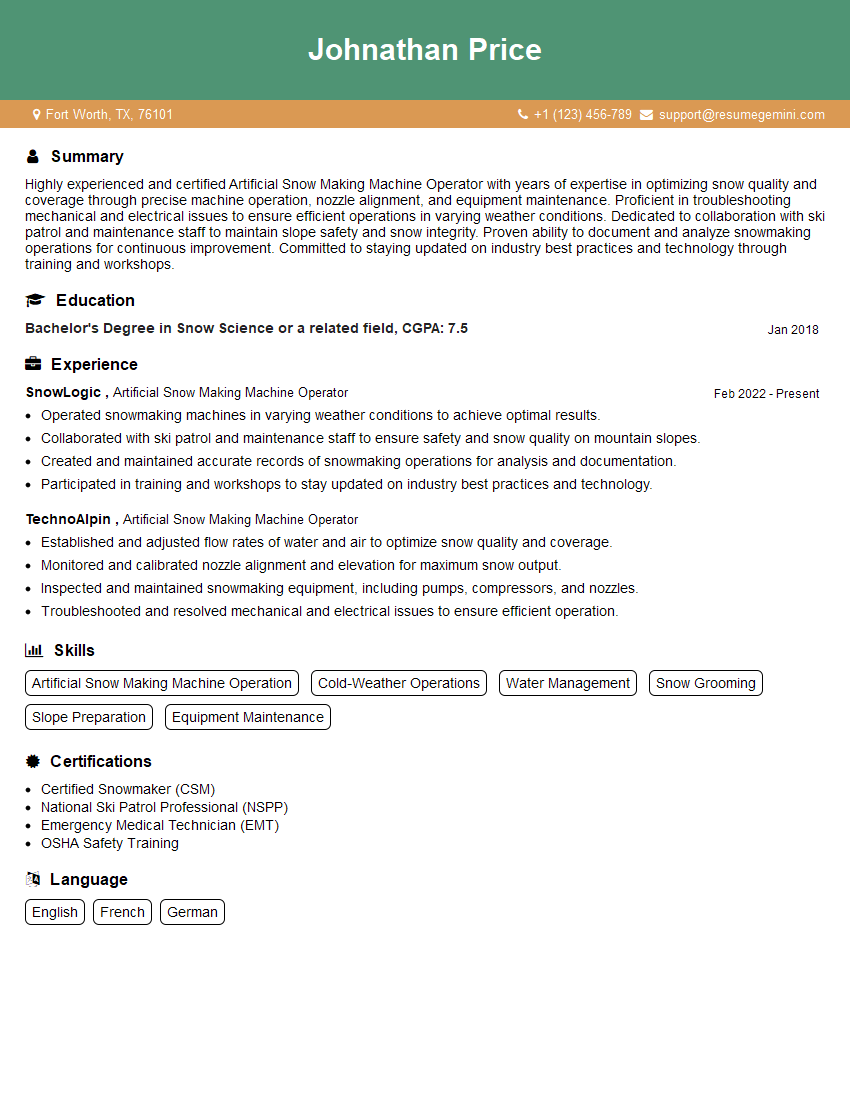Are you a seasoned Artificial Snow Making Machine Operator seeking a new career path? Discover our professionally built Artificial Snow Making Machine Operator Resume Template. This time-saving tool provides a solid foundation for your job search. Simply click “Edit Resume” to customize it with your unique experiences and achievements. Customize fonts and colors to match your personal style and increase your chances of landing your dream job. Explore more Resume Templates for additional options.

Johnathan Price
Artificial Snow Making Machine Operator
Summary
Highly experienced and certified Artificial Snow Making Machine Operator with years of expertise in optimizing snow quality and coverage through precise machine operation, nozzle alignment, and equipment maintenance. Proficient in troubleshooting mechanical and electrical issues to ensure efficient operations in varying weather conditions. Dedicated to collaboration with ski patrol and maintenance staff to maintain slope safety and snow integrity. Proven ability to document and analyze snowmaking operations for continuous improvement. Committed to staying updated on industry best practices and technology through training and workshops.
Education
Bachelor’s Degree in Snow Science or a related field
January 2018
Skills
- Artificial Snow Making Machine Operation
- Cold-Weather Operations
- Water Management
- Snow Grooming
- Slope Preparation
- Equipment Maintenance
Work Experience
Artificial Snow Making Machine Operator
- Operated snowmaking machines in varying weather conditions to achieve optimal results.
- Collaborated with ski patrol and maintenance staff to ensure safety and snow quality on mountain slopes.
- Created and maintained accurate records of snowmaking operations for analysis and documentation.
- Participated in training and workshops to stay updated on industry best practices and technology.
Artificial Snow Making Machine Operator
- Established and adjusted flow rates of water and air to optimize snow quality and coverage.
- Monitored and calibrated nozzle alignment and elevation for maximum snow output.
- Inspected and maintained snowmaking equipment, including pumps, compressors, and nozzles.
- Troubleshooted and resolved mechanical and electrical issues to ensure efficient operation.
Certificates
- Certified Snowmaker (CSM)
- National Ski Patrol Professional (NSPP)
- Emergency Medical Technician (EMT)
- OSHA Safety Training
Languages
- English
- French
- German
Career Expert Tips:
- Select the ideal resume template to showcase your professional experience effectively.
- Master the art of resume writing to highlight your unique qualifications and achievements.
- Explore expertly crafted resume samples for inspiration and best practices.
- Build your best resume for free this new year with ResumeGemini. Enjoy exclusive discounts on ATS optimized resume templates.
How To Write Resume For Artificial Snow Making Machine Operator
- Highlight your experience and expertise in operating artificial snow making machines.
- Demonstrate your knowledge of snow science and snowmaking techniques.
- Emphasize your ability to troubleshoot and resolve mechanical and electrical issues.
- Showcase your commitment to safety and collaboration with ski patrol and maintenance staff.
- Include any relevant certifications or training in the field.
Essential Experience Highlights for a Strong Artificial Snow Making Machine Operator Resume
- Established and adjusted flow rates of water and air to optimize snow quality and coverage.
- Monitored and calibrated nozzle alignment and elevation for maximum snow output.
- Inspected and maintained snowmaking equipment, including pumps, compressors, and nozzles.
- Troubleshooted and resolved mechanical and electrical issues to ensure efficient operation.
- Operated snowmaking machines in varying weather conditions to achieve optimal results.
- Collaborated with ski patrol and maintenance staff to ensure safety and snow quality on mountain slopes.
- Created and maintained accurate records of snowmaking operations for analysis and documentation.
Frequently Asked Questions (FAQ’s) For Artificial Snow Making Machine Operator
How does an artificial snow making machine work?
Artificial snow making machines work by combining compressed air and water to create small ice crystals. The mixture is then projected into the air, where it freezes into snow.
What are the different types of artificial snow making machines?
There are two main types of artificial snow making machines: fan guns and airless guns. Fan guns use a fan to propel the snow into the air, while airless guns rely on high pressure to create a fine mist of snow.
What are the benefits of using artificial snow?
Artificial snow can be used to supplement natural snowfall or to create snow in areas where there is no natural snow. It can also be used to create specific snow conditions, such as hard-packed snow for racing or soft snow for skiing.
What are the challenges of operating an artificial snow making machine?
Operating an artificial snow making machine can be challenging due to the need to adjust the water and air flow rates to create the desired snow quality and coverage. It is also important to monitor the weather conditions and to troubleshoot any mechanical or electrical issues that may arise.
What is the future of artificial snow making?
The future of artificial snow making is bright. As technology continues to improve, artificial snow making machines will become more efficient and effective. This will allow for the creation of more consistent and reliable snow conditions, which will improve safety and allow for a longer ski season.
What are the environmental impacts of artificial snow making?
Artificial snow making can have some environmental impacts, such as the use of water and energy. However, these impacts can be minimized by using water from sustainable sources and by using energy-efficient snow making machines
Is artificial snow as good as natural snow?
Artificial snow is not quite as good as natural snow, but it can be a good substitute when natural snowfall is unavailable. Artificial snow is typically harder and less dense than natural snow, but it can still be used for skiing, snowboarding, and other winter sports.